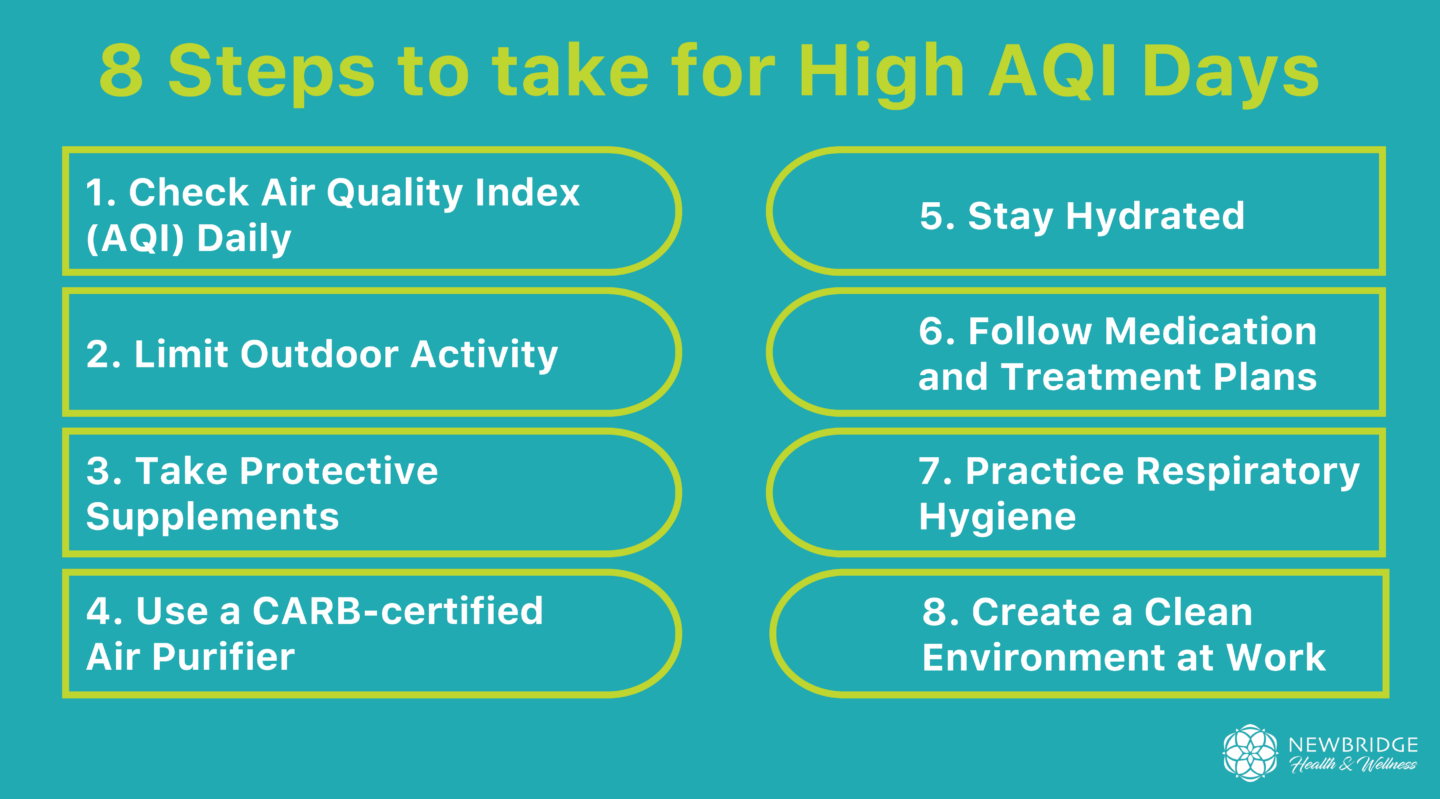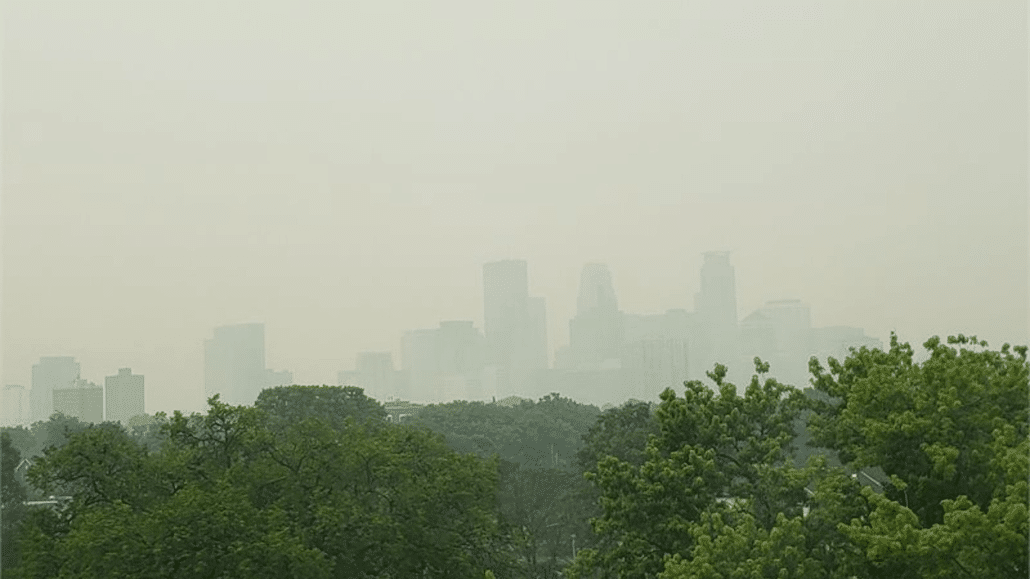Across the world, the reality of climate change means that we are all experiencing diverse weather patterns, including periods of high Air Quality Index (AQI) due to various environmental factors, especially wildfires. And wildfire “seasons” are becoming longer, which means more and more, AQI is a concern for most of us.
What’s more – wildfires can have a significant impact on air quality even if they are blazing in a seemingly far away place – i.e., in another state or country. However, during periods of active wildfires, the smoke can travel long distances, affecting the air quality in regions far from the actual fire. This smoke contains harmful pollutants, such as fine particulate matter (PM2.5), which can irritate the respiratory system and pose health risks, particularly for individuals with pre-existing respiratory conditions, but also for those without health issues.
Are you concerned about the effects of wildfires on your chronic illness? Reach out to Newbridge Health and Wellness today to learn what you can do to help prevent adverse reactions to low air quality.
Air Quality: Understanding the Level of Risks
It’s safe to say that for most, air quality is a growing concern. But is there anything we can really do to minimize the adverse effects of poor air quality, especially when wildfire smoke arrives in our region? Fortunately, the answer is yes! In this blog, we will discuss effective strategies you can adopt at home, at work, and while outdoors that will help you navigate poorer air quality when it matters – like during wildfire season.
But first, let’s take a look at AQI levels and what they mean for us all. While specific recommendations may vary slightly depending on individual health conditions and sensitivity, it is generally advisable for everyone to stay indoors when the Air Quality Index (AQI) reaches certain levels. The following AQI levels serve as general guidelines for staying indoors:
AQI 0-50 (Good): Air quality is considered good, and it is generally safe for everyone to be outdoors.
AQI 51-100 (Moderate): Air quality is acceptable, but sensitive individuals, such as those with respiratory conditions, may experience mild discomfort. It is generally safe for most people to be outdoors, but those who are more susceptible to pollution may choose to limit prolonged or intense outdoor activities.
AQI 101-150 (Unhealthy for Sensitive Groups): Air quality is unhealthy for sensitive individuals, including those with respiratory conditions, older adults, and children. It is recommended that individuals in these groups reduce prolonged or intense outdoor exertion and consider spending more time indoors.
AQI 151-200 (Unhealthy): Air quality is unhealthy for everyone, not just sensitive groups. It is advisable for all individuals to limit outdoor activities, especially prolonged or intense exertion. Staying indoors and reducing exposure to outdoor pollutants is crucial during these conditions.
AQI 201-300 (Very Unhealthy): Air quality is very unhealthy, and everyone is at risk of adverse health effects. It is strongly recommended that individuals stay indoors as much as possible, avoiding outdoor activities and physical exertion. If venturing outside is necessary, wearing a properly fitted mask rated for particle filtration (e.g., N95 and KN95 masks) is highly recommended.
AQI 301 and above (Hazardous): Air quality is hazardous, and the risk of severe health effects is significantly increased. It is imperative for everyone to remain indoors, with windows and doors sealed, and to avoid any outdoor activities. If venturing outside is absolutely necessary, wearing a high-quality mask with effective filtration is crucial.
Remember that these guidelines are general recommendations, and individual circumstances, health conditions, and local advisories should be taken into account. Monitoring the AQI regularly, following local health authority recommendations, and using personal judgment to protect your health are essential during periods of high pollution and poor air quality.
Steps You Can Take to Safeguard Yourself and Your Environment

Do a Daily Check of Air Quality Index (AQI)
Stay informed about the daily air quality conditions in your area by regularly checking the AQI. Several websites and smartphone applications provide real-time updates on air quality, such as AirNow and local weather apps, or the general weather app already on your smartphone. By staying aware of the AQI, you can plan your activities for indoors or outdoors, accordingly.
Limit Outdoor Activity on high AQI days/Mask When Outdoors
When the AQI is high, it’s important to reduce your exposure to outdoor air pollutants. Minimize physical exertion and try to stay indoors as much as possible, especially during peak pollution hours. If you need to be outside, consider doing so during times when the AQI is lower, typically early morning or evening. And at the very least, wear an N-95 or p100 disposable particulate respirator mask when breathing outdoor air. It must be fitted tightly at all times, and it is advised that a new mask is used every day.
Take Protective Supplements
Human studies have shown that nutrients can have a protective effect with smoke exposure’s damaging effect on respiratory and cardiovascular systems. Some of the most effective vitamins include Vitamin C, Sulforphane, NAC, Vitamin D, Apigenin, Quercetin, Myricetin, and Hydroxytyrosol. Make an appointment with your functional medicine provider to discuss appropriate dosing of these supplements.
Create a Clean Indoor Environment
Make your home a safe haven during high AQI days. Keep windows and doors closed to prevent outdoor pollutants from entering your living space. Install a high-efficiency filter (MERV 13 rating or higher) with a MERV rating as high as your system can handle, based on the manufacturer’s recommendation. Consider a Carb-ceritified air cleaner to further enhance indoor air quality and reduce the presence of allergens and pollutants. (We recommend the IQAir GC Multigas or AustinAir Healthmate or an equivalent weight activated charcoal/HEPA system that has the ability to filter particulate < .003 microns in diameter). If you have a central ducted air conditioning and heating system, be sure to set the system to “on” to ensure air is being filtered constantly, rather than “auto,” which runs the system intermittently. If your system brings fresh air into the home, close the fresh-air intake so that it operates in in recirculation mode to prevent outdoor smoke from getting inside.
Also – remove your shoes before entering your home. Wildfires release a wide range of pollutants and toxic substances into the air, including ash, soot, and harmful chemicals. These contaminants can settle on the ground and be tracked indoors on the soles of your shoes. By removing your shoes before entering your living space, you can prevent the outdoor pollutants from being distributed throughout your home, thereby reducing your exposure to potentially harmful substances. Designate a specific area near the entrance to leave your shoes or consider using washable slippers to maintain a cleaner indoor environment. Additionally, regularly sweeping your entryway can help minimize the presence of outdoor pollutants in your home, further safeguarding your indoor air quality.
Stay Hydrated
Drinking plenty of water is crucial for maintaining good health, especially during high AQI days. Hydration helps to flush out toxins and keep your respiratory system functioning optimally. Avoid excessive intake of caffeinated or sugary beverages, as they can dehydrate your body.
Follow medication and treatment plans
If you have pre-existing respiratory conditions, ensure that you consistently follow your prescribed medication and treatment plans. Consult with your healthcare provider to discuss any necessary adjustments during periods of high air pollution. It’s also important to have an adequate supply of necessary medications on hand in case of any emergencies.
Practice respiratory hygiene
Protecting your respiratory system becomes even more crucial during high AQI days. If you need to go outside, wear a properly fitted mask that provides effective filtration against air pollutants. N95 masks or masks labeled with NIOSH (National Institute for Occupational Safety and Health) approval are recommended for better protection. Additionally, practicing good respiratory hygiene, such as covering your mouth and nose when coughing or sneezing, can help prevent the spread of respiratory infections.
Create a clean environment at work
If you spend a significant amount of time at your workplace, inquire about the air quality and ventilation systems in the building. Encourage your employer to provide adequate measures, such as air purifiers or proper ventilation, to ensure a healthy working environment for employees. If necessary, consider discussing remote work options during periods of high AQI.
While high AQI days can pose challenges, following these strategies can help you stay healthy and minimize the adverse effects of poor air quality. By monitoring the AQI, staying indoors, maintaining a clean environment, and taking care of your respiratory system, you can better safeguard your health and well-being. Remember, it’s always essential to consult with your healthcare provider for personalized advice and recommendations to address any specific health concerns during high AQI periods. Stay informed, stay healthy, and take proactive steps to protect yourself and your loved ones.
Could you benefit from better air quality? Want to discuss even more strategies to support your health? Request a functional medicine consultation here.


